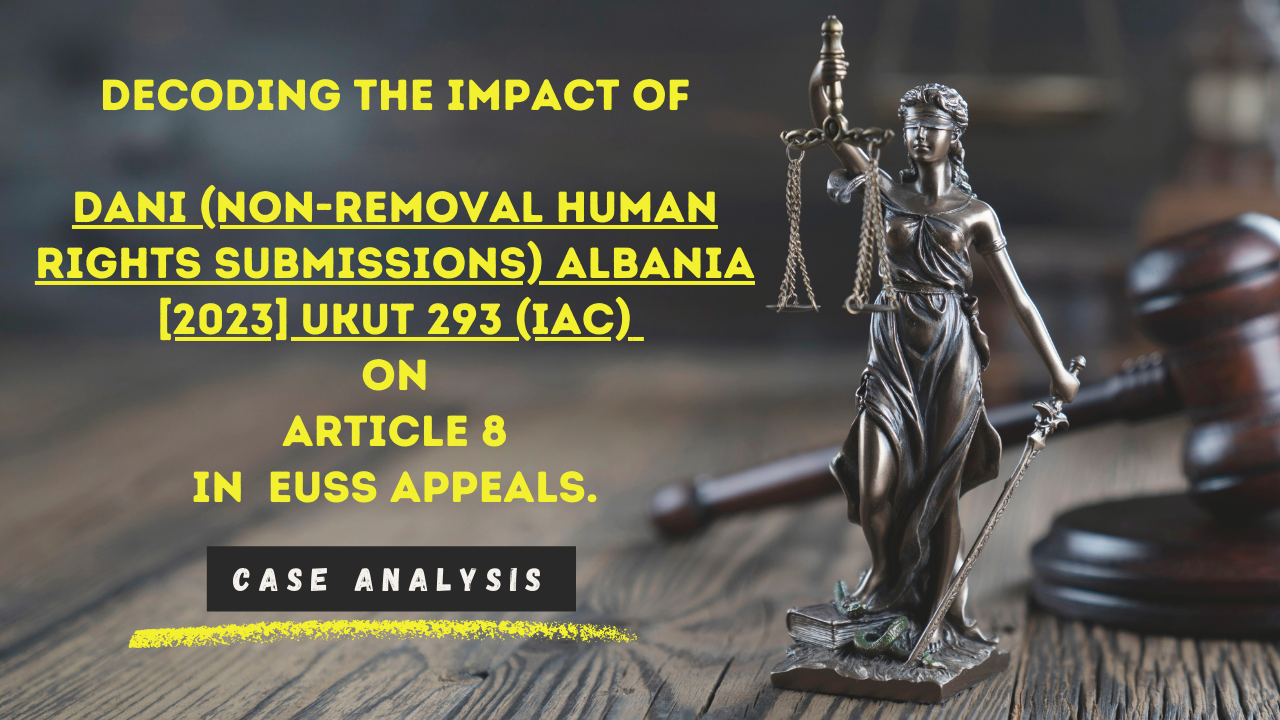The appellant, an Albanian citizen, entered the UK clandestinely in 2013 and has been residing there since. In 2016, he initiated a relationship with Carmen Maria Morente Fuentes, a Spanish citizen living in the UK under the EU Settlement Scheme (EUSS). The appellant applied for a residence card as the durable partner of the sponsor in late 2020 under the Immigration (European Economic Area) Regulations 2016, but the application was denied by the Secretary of State, citing a lack of recognition of a durable relationship.
The appellant and sponsor intended to marry from May 2020 but were delayed by the COVID-19 pandemic. They eventually married on 24 April 2021. Subsequently, the appellant applied for pre-settled status under the EU Settlement Scheme. However, the application was rejected by the Secretary of State on 28 November 2021, as the marriage occurred after the specified date in the Immigration Rules, set at 11 PM on 31 December 2020.
The appellant appealed to the First-tier Tribunal against the Secretary of State’s decision of 28 November 2021. The appellant claimed the denial of their EU Settlement Scheme leave breached Article 8 ECHR and was unlawful. The Secretary of State wrongly rejected their durable partner application due to the timing and the COVID-19 pandemic preventing marriage. The appellant argued there was no public interest in their removal.
To back his submission under the human rights the counsel argued that “under section 7(1)(b) of the Human Rights Act, the appellant was entitled to rely on human rights-based grounds in any event. The tribunal enjoyed the jurisdiction to consider whether the refusal of the appellant’s application amounted to an unlawful interference with his rights under Article 8 of the European Convention on Human Rights (“the ECHR”).
This was interesting during the appeal hearing the Appellant;’s counsel accepted that“the appellant could not succeed under the Appendix EU as drafted, largely for the reasons given by the Secretary of State in the refusal letter.”
The FtT refused the appeal and it was appealed to the upper tribunal. The UT provided the following ruling:
1) The mere refusal of leave to remain under the EUSS is not, without more, a “human rights claim” under section 113(1) of the 2002 Act.
2) Consequently, the “new matter” regime does not regulate the Tribunal’s consideration of non-removal human rights submissions.
3) But the Tribunal may only consider matters which it thinks are “relevant to the substance of the decision appealed against”.
4) Whether Article 8 is engaged by a decision to refuse an EUSS application is not “relevant to the substance of the decision appealed against”; the Tribunal can not consider it. The Tribunal does not enjoy a broad, unencumbered jurisdiction to consider non-removal human rights submissions at large.
5) In any event, Article 8 will not, without more, be engaged by a decision to refuse leave to remain under the EUSS.
6) Section 7(1)(b) of the Human Rights Act 1998 does not permit an appellant to advance a free-standing Article 8 claim in proceedings before the First-tier Tribunal.
This effectively means that any attempt to sneak in a Human Rights claim in an EUSS application will not be successful. Of course, many could say that this is obvious as such claims should have been made by making a separate application based on Human Rights [e.g. FLR (FP) or FLR (HRO)] or in an appeal following an application made under Appendix FM. However, it was not unusual to attempt to rely on human rights grounds in an EUSS application.
In all honestly the premise of the EUSS application is nearly identical to an appendix FM application in terms of relationship requirements (except the relevant date requirement) and this is the ‘relationship part’ which leads to human rights claims under any refusal for an Appendix FM application. So on that logic, I wouldn’t blame the lawyer for appealing to argue the human rights grounds but as said earlier following this case which gave clear guidelines and interpretation of the withdrawal agreement 2020, it is unlikely to be successful.
Now, If a person wishes to bring up a human rights claim when appealing the rejection of their application under the EU SS, and they didn’t bring up human rights during the initial application, they are required to seek permission from the Home Secretary. This is done under regulation 9(5) of the Immigration (Citizens’ Rights Appeals) (EU Exit) Regulations 2020. In simpler terms, if you want to talk about human rights in your appeal but didn’t mention it before, you need the Home Secretary’s approval according to these regulations.


